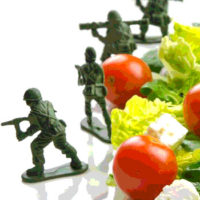Food Safety Insights has always been designed to uncover information and data about food safety practices and the markets that support them. We do this by asking you about your work and the issues you deal with on a regular basis. Because this column is about you and your work, we are always interested in what you like to hear about.
This column was inspired by a comment sent in to the Food Safety Matters podcast. A listener suggested that we ask food safety professionals what are the most important things they have learned during their careers—that is, what were their key lessons learned over the course of their food safety career?
So, we asked. And we received answers from more than 450 respondents across all types of food processing categories plus government, consulting, and laboratory professionals. The individuals responding also represented many specialties, including food safety, microbiology, chemistry, regulatory affairs, quality assurance/quality control, plant operations, general management, sales/marketing, training/teaching, and others with food safety experience, ranging from less than 1 year to more than 50 years, with a median level of experience of 18 years.
This survey was unique compared with our previous surveys in that outside of a few demographic questions, we substantially asked only one question: What is your single most important “lesson learned” about food safety in your career?
There is some difficulty in characterizing qualitative data, especially answers to such an open-ended question. But we will attempt to categorize the answers and address a few of the “lessons” that we heard.
Take-Home Lessons
In what will not come as a surprise to many people, comments about culture and people were the most common. Most of these comments mentioned the need for buy-in from everyone in the company and creating a food safety culture that respects and values food safety at all levels. Without first creating such a top-to-bottom culture, everything else that needs to be done is made more difficult or even impossible. If you can get this buy-in, however, the respondents believe that the other factors more easily fall into place. Many of the comments mentioned the need to first get management’s buy-in. One respondent mentioned, “Everything is up to management. If senior management isn’t involved, nothing else is going to work.” But it was also recognized that culture is not solely a top-down affair and that everyone in the company needs to be involved. As another respondent mentioned, “You can have all the policies and procedures in the world; it doesn’t matter if the people on the floor don’t buy in. They can foil a plan just trying to do ‘what they’ve always done.’ It is a full team effort.”
 Second, but only slightly behind culture, was the need for constant diligence and working proactively within your food safety program (Figure 1). Many emphasized that food safety can be impacted in many ways; you can never be sure where something could go wrong, so you should maintain your focus and diligence. “Food safety is a 365-24-7 activity… All the time, food safety is something to live, not to do.” And according to others, “You can never let up…” and “…you need to live food safety every day, not just on audit day!” The need to never compromise on fundamentals and never take shortcuts were also key themes, with one educator summarizing this idea very succinctly, saying, “If you do not have 15 seconds to take the temperature of food you are preparing to assure it is safe to consume—GET OUT OF FOOD-SERVICE!”
Second, but only slightly behind culture, was the need for constant diligence and working proactively within your food safety program (Figure 1). Many emphasized that food safety can be impacted in many ways; you can never be sure where something could go wrong, so you should maintain your focus and diligence. “Food safety is a 365-24-7 activity… All the time, food safety is something to live, not to do.” And according to others, “You can never let up…” and “…you need to live food safety every day, not just on audit day!” The need to never compromise on fundamentals and never take shortcuts were also key themes, with one educator summarizing this idea very succinctly, saying, “If you do not have 15 seconds to take the temperature of food you are preparing to assure it is safe to consume—GET OUT OF FOOD-SERVICE!”
Never Stop Learning
In our poll, people also emphasized the importance of education and training, and how education has served them in their career. “Education is the most important factor in any food safety system,” mentioned one. The responses included not only initial education and training in terms of basic education and job skills training but also the roles that continuing education and “keeping up” play in maintaining a successful program. Many mentioned the constantly evolving nature of food safety technologies and processes, and to have the best program possible, you must be current in what new options are available to you and the best way to implement them to benefit your program. “Keep current with technological and testing advances, and pay attention to foodborne illness outbreaks and food product recalls to keep your food safety plan current,” said one, while another mentioned, “Taking training and educational courses to keep up with changing regulation and audit schemes is essential.” One respondent summed up these ideas very directly, saying, “Never, I mean NEVER, stop learning!”
People also frequently cited the importance of using good science and accurate testing to guide their programs. Many mentioned the importance of being “data-driven,” trusting only that which you can verify with data. Others mentioned the need to fully understand all the data that you get from various sources and not to simply accept any data solely as hard and fast numbers. Many factors in sampling, analysis, and analytical techniques can lead to errors and variability, and ignoring these factors can lead to misinterpretation. However, many mentioned the need to always question and “dig deeper.” One individual, alluding to test variability and the averaging of results, said, “Averages do not matter much, as someone will eat everything produced…consumer testing is 100%.”
One respondent focused their lesson on the practical application of all this knowledge, saying, “…when you know you are right, it is possible to argue with an inspector or regulator as long as you do it in a professional manner—regulators do listen.”
Other Important Learnings
Not surprisingly, many revealed that they have learned that sanitation—with a high number of responses specifically mentioning handwashing (by almost one-half of those who highlighted sanitation)—was the key to their program’s success, saying, “Never underestimate the importance of effective cleaning and sanitation processes” and “Nothing is ever clean enough!” One respondent seemed to pull together several elements of an integrated food safety system, training, employees, and sanitation by saying, “Well-planned sanitary design properly implemented enables well-trained and diligent people to do the right thing.”
Many people also emphasized the critical nature of food safety and the risks we are all called on to manage, recognizing that mistakes can literally be a matter of life or death. “There is no such thing as ‘too safe,’” said one, with another adding, “Others depend on me for safe food to eat.” One professional—a company chief science officer with 40 years of experience, said, as a guide to making your decisions, “Ask yourself the question ‘What is the worst that can happen, and can I live with that?’”
Many people also emphasized that their greatest lesson was the importance of communication. Since food safety culture and the importance of buy-in by everyone involved is essential to the success of a food safety program, it is important to have everyone understand exactly what the elements of the program and its goals are. Many mentioned the importance of being able to have frank and honest communications between all levels of an organization and across all departments. Many emphasized the need to “eliminate silos” and make sure that “food safety is everyone’s responsibility” and not just a function of the quality assurance or food safety department. The importance of listening at all levels was also key, with one person saying, “Listen to your employees. They are the ones doing the job, and they do care about making a safe product. If they see something that they feel is a concern, investigate it. It may be nothing or it may be a huge problem, but if you ignore the employee, they will likely not report a concern again and that could be disastrous.”
As we mentioned earlier, many people also emphasized the need to have senior management involved in their program and stressed the importance of having them understand why food safety is important and why it should be a priority. There is, of course, no shortage of stories of frustration on the part of food safety professionals trying to get senior management to listen and understand. Some emphasized the need to find a common language and talk to them on their terms. One respondent mentioned that what worked for her was to “…learn business acumen within the company that I worked for; to understand the language and business practices of the company was paramount in building a sense of buy-in for food safety practices and culture…” and “…it helped make me part of the team and not a siloed expert.”
Conclusions
This survey uncovered insightful lessons learned from food safety experts that we can all take as advice. It is interesting that most of the skills cited in these “lessons learned” are not scientific or technical, but are related to communication, culture, education, and execution. When looking for a way to summarize the comments to close the article, I found one comment that seemed to be particularly poignant and captured a great overall message:
“Food safety is a culture that we need to develop over time. It’s a journey for the leadership team (not only quality assurance) and employees with the expected vision to protect our consumers and the brand. Most of the skills required for this transformational change are not commonly taught in science programs at colleges or universities, and more work is needed in the industry.”
Well said.
Bob Ferguson is president of Strategic Consulting Inc. and can be reached at foodsafetyinsights@gmail.com or on Twitter at @SCI_Ferguson.
Lessons Learned: Careers in Food Safety




